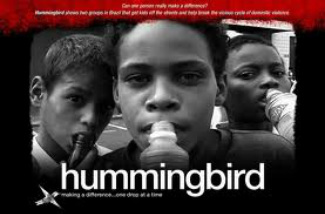 Hummingbird chronicles an effort to help street kids in Brazil. Tags: children/youth, emotion/desire, inequality, rural/urban, social mvmts/social change/resistance, violence, domestic abuse, homelessness, human rights, pedagogy of affection, poverty, sex trafficking, street children, subtitles/CC, 21 to 60 mins Year: 2007 Length: 47:33 Access: www.hummingbirdmovie.com Summary: Often, after learning about the numerous social problems plaguing our society, students ask: "But what can we do?" and sometimes they express a sense of hopeless by suggesting that "things will never change." Hummingbird, an award-winning documentary film, was in some ways created in this same spirit of curiosity about the possibility of change amidst seemingly insurmountable social problems. Filmmaker Holly Mosher explains at the outset of the film why she visited the Brazilian city of Recife: "I visited because I wanted to see if it was really possible for kids who have lived all their lives amongst violence and misery to become part of a society that has always rejected them." The film chronicles the story of how two nonprofits in Brazil use the pedagogy of affection to help street kids and women break the vicious cycle of domestic violence. The pedagogy of affection is a method of social change whereby people help people, steeped in the belief that affection, touch, and caring are essential to holistic health and personhood. Viewers are encouraged to consider the various ways social change is effected and represented in the film, and specifically the role of grassroots organizations and communities that embrace hope and "an indefatigable spirit in the face of threats, financial difficulties, and a culture seemingly unable or unwilling to reform itself." At the 44:19 minute mark, Cecy Prestrello, co-founder of the non-profit Coletivo Mulher Vida (Women’s Life Collective), recounts the following story: "There was a fire in the forest. And all the animals were running around, crazed. Then a hummingbird began to pick up water in its beak and put it on the fire. And the lion stopped and watched. He said 'Are you crazy hummingbird? You have to protect yourself, like all the others. What are you doing?' The hummingbird replied 'I am doing my part…and what about you? What are you doing?'" Prestrello's perspective on social change would pair well with Allan G. Johnson's piece, "What Can We Do? Becoming Part of the Solution." Submitted By: Holly Mosher
2 Comments
Manuel Franco
7/29/2023 02:59:37 am
I just want to say Thank You to everyone who supported me through the years. My name is Manuel Franco, New Berlin, Wisconsin. My story of how I won the Powerball lottery of $768.4M is a bit of a tale. I have been playing Powerball tickets for 6 years now since I turned 18. I bought my first ticket on my 18 birthday. I was feeling very lucky that day because I had contacted Dr. Odunga Michael to help me with the winning Powerball numbers. I really had that great great feeling that I looked at the camera wanting to wink at it. I only did a tiny part of it and trusted him. He gave me the numbers after I played a couple other tickets along with it for $10. I checked my ticket after the winnings came online and saw the numbers were correct including the Power play. I screamed for about 10 minutes because it felt like a dream. I had won $768.4M. You can check my winning testimony with the lottery officials just with my name search. Thank you Dr Odunga. Well, his email is [email protected] and you can also call or Whats-app him at +2348167159012 so you guys can contact him
Reply
mark hold
7/8/2024 12:31:15 am
Herbal Penis Enlargement product is 100% guaranteed to Enlarge and get a better ERECTION, the reason why most people are finding it difficult to enlarge Penis is that they believe in medical reports, drugs and medical treatment which is not helpful for Penis Enlargement. Natural roots/herbs are the best remedies which can easily Enlarge your Penis permanently Contact Dr MOSES BUBA via Email: [email protected] or via WhatsApp: +2349060529305. for Natural root and herbal remedies put together to help Enlarge manhood and Erect healthily. I also learn that Dr MOSES BUBA also can cure other types of diseases, HEPATITIS B,DIABETICS,CANCER,HPV,LOW SPERM CAM, HIV/STDS, FIBROSIS LOST OF WEIGHT, BREAST ENLARGEMENT, HIPS and BUMS ENLARGEMENT etc .
Reply
Leave a Reply. |
Tags
All
.
Got any videos?
Are you finding useful videos for your classes? Do you have good videos you use in your own classes? Please consider submitting your videos here and helping us build our database!
|
 RSS Feed
RSS Feed
